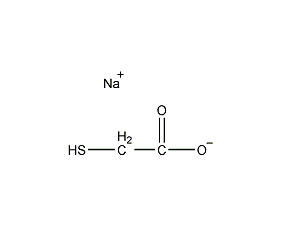sodium thioglycolate

Structural formula
| Business number | 04GS |
|---|---|
| Molecular formula | C2H3NaO2S |
| Molecular weight | 114.10 |
| label |
sodium thioglycolate, sodium thioglycolate, Thioglycolic acid (sodium salt), Sodium thioglycolate; sodium thioglycolate;, Sodium thioglycolate, Thioglycolic acid sodium salt, bacterial culture medium |
Numbering system
CAS number:367-51-1
MDL number:MFCD00043386
EINECS number:206-696-4
RTECS number:AI7700000
BRN number:4569109
PubChem number:24899901
Physical property data
1. Physical property data
Characteristics: White crystal. Deliquescent. Slightly special smell.
Density (g/mL, 25/4℃): Not available
Relative vapor density (g/mL, Air=1): Not available
Melting point (ºC): >300
Boiling point (ºC, normal pressure): Not available
p>
Boiling point (ºC, 5.2kPa): Not available
Refractive index: Not available
Flash Point (ºC): Not available
Specific rotation (º): Not available
Autoignition point or ignition temperature (ºC): Not available
Vapor pressure (kPa, 25ºC): Not available
Saturated vapor pressure (kPa, 60ºC): Not available
Heat of combustion (KJ/mol): Not available
Critical temperature (ºC): Not available
Critical pressure (KPa): Not available
Log value of oil-water (octanol/water) partition coefficient: Not available
Explosion upper limit (%, V/V): Not available
Lower explosion limit (%, V/V): Not available
Solubility:Easily soluble in water, slightly soluble in ethanol. It will change color when exposed to air or exposed to iron. If the color turns yellow or black, it has deteriorated and cannot be used.
Toxicological data
2. Toxicological data:
Acute toxicity: LD50 (rat, abdominal cavity) LD50: 148mg/kg. Irritating
Ecological data
Water hazard class 1 (German Regulation) (self-assessment via list) The substance is slightly hazardous to water.
Do not allow undiluted or large amounts of product to come into contact with groundwater, waterways or sewage systems.
Do not discharge materials into the surrounding environment without government permission.
Molecular structure data
None yet
Compute chemical data
1. Reference value for hydrophobic parameter calculation (XlogP): None
2. Number of hydrogen bond donors: 1
3. Number of hydrogen bond acceptors: 3
4. Number of rotatable chemical bonds: 1
5. Number of tautomers: none
6. Topological molecule polar surface area 41.1
7 .Number of heavy atoms: 6
8. Surface charge: 0
9. Complexity: 46.8
10. Number of isotope atoms: 0
11. Determine the number of atomic stereocenters: 0
12. Uncertain number of atomic stereocenters: 0
13. Determine the number of chemical bond stereocenters: 0
14. Number of uncertain chemical bond stereocenters: 0
15. Number of covalent bond units: 2
Properties and stability
Basic properties
It has a slight special smell, and it has a slight smell when it is first made. Hygroscopic. It will change color when exposed to air or exposed to iron. If the color turns yellow or black, it has deteriorated and cannot be used again. Irritating
Storage method
Should be stored sealed and dry at 4°C away from light.
Synthesis method
1. Cool the pre-filtered thioglycolic acid to 5℃, and slowly add 40% sodium hydroxide with a temperature below 5℃ while stirring. When the temperature of the solution reaches 35°C, hydrogen sulfide gas begins to escape. When the solution turns pink and stable crystals precipitate, stop adding sodium hydroxide:
![]()
Cool to room temperature, filter and crystallize Soak in ethanol, then wash until colorless, and dry below 80°C to get the finished product.
Purpose
1. Bacterial culture medium. Conduct iron test.
2. Determination of analytical reagents, such as iron, molybdenum, silver, tin, etc. Prepare bacterial culture medium.
3. Used as analytical reagents, such as masking agents. Also used for culture medium preparation.
